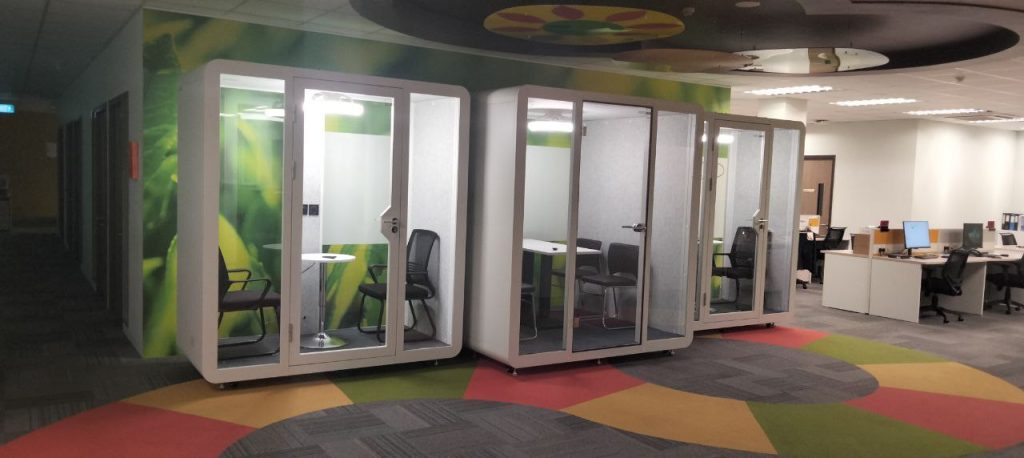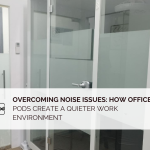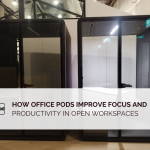No pods added to your quote request yet. Add some now for a free quote!
The Environmental Benefits of Sustainable Office Pods

In recent years, the growing focus on sustainability has led to innovative approaches in various industries, including office design. One of the most significant advancements in creating eco-friendly workplaces is the development of sustainable office pods. These modular, flexible workspaces offer numerous environmental benefits, making them an ideal choice for businesses committed to reducing their carbon footprint and promoting a greener future.
1. Reduced Construction Waste
Traditional office construction generates a considerable amount of waste, including excess materials, packaging, and debris. Sustainable office pods, on the other hand, are typically prefabricated off-site, which means that they are manufactured in a controlled environment where waste is minimized. The modular nature of office pods allows for precise material usage, significantly reducing the amount of leftover materials. Additionally, the prefabrication process often involves using recycled or renewable materials, further contributing to waste reduction.
Moreover, the installation of office pods involves minimal on-site construction work, which means less disruption to the environment and a reduction in construction-related pollution. This efficient approach to building workspaces not only reduces waste but also speeds up the installation process, allowing businesses to set up their offices with minimal environmental impact.
2. Energy Efficiency
Sustainable office pods are designed with energy efficiency in mind. Many of these pods incorporate energy-saving technologies such as LED lighting, smart thermostats, and energy-efficient windows. The insulation in these pods is often superior to that found in traditional office buildings, ensuring that the pods maintain a comfortable temperature without over-reliance on heating or cooling systems. This not only reduces energy consumption but also lowers utility costs for businesses.
In addition to their energy-efficient design, some sustainable office pods are equipped with renewable energy sources, such as solar panels. These panels can generate electricity for the pod, reducing the reliance on non-renewable energy sources and contributing to a lower carbon footprint. By integrating renewable energy solutions, businesses can further enhance the sustainability of their office spaces.
3. Resource Conservation
The materials used in sustainable office pods are often chosen for their low environmental impact. For example, many office pods are constructed from sustainably sourced wood, recycled metal, and eco-friendly insulation materials. These materials not only reduce the environmental impact of the construction process but also contribute to a healthier indoor environment for employees.
Additionally, the modular nature of office pods means that they can be easily reconfigured, relocated, or expanded as needed, reducing the need for new construction. This flexibility allows businesses to adapt their office spaces without the need for extensive renovations, conserving resources and reducing waste.
Sustainable office pods also promote the efficient use of space. By providing dedicated, compact workspaces, these pods can help businesses optimize their office layouts, reducing the overall square footage needed for operations. This space efficiency translates into less material usage and lower energy consumption, further contributing to the environmental benefits of these innovative workspaces.
4. Reduced Carbon Footprint
The environmental benefits of sustainable office pods extend beyond the immediate workspace. By providing businesses with flexible, modular office solutions, these pods can contribute to a reduced carbon footprint in several ways. For instance, companies that adopt office pods may be able to reduce the need for large, centralized office buildings, allowing employees to work closer to home or even remotely. This can lead to a decrease in commuting-related emissions, as fewer employees need to travel long distances to reach their workplaces.
Moreover, sustainable office pods are often designed with lifecycle considerations in mind. This means that the materials used in their construction can be easily recycled or repurposed at the end of the pod’s life, reducing the environmental impact of disposal. This focus on sustainability throughout the entire lifecycle of the office pod further enhances its environmental credentials.
5. Improved Employee Well-being
While the primary focus of sustainable office pods is on environmental benefits, it’s important to note that these spaces also contribute to the well-being of employees. Sustainable office pods are often designed to maximize natural light, improve air quality, and reduce noise pollution, creating a healthier and more productive work environment. A healthier workspace not only benefits employees but can also lead to increased job satisfaction and lower turnover rates, indirectly contributing to a more sustainable business model.
Conclusion
Sustainable office pods represent a forward-thinking approach to office design that aligns with the growing emphasis on environmental responsibility. By reducing construction waste, improving energy efficiency, conserving resources, and minimizing carbon footprints, these innovative workspaces offer numerous environmental benefits. Additionally, their positive impact on employee well-being and their adaptability to changing business needs make them a smart choice for companies looking to create a sustainable and flexible work environment. As businesses continue to prioritize sustainability, the adoption of sustainable office pods is likely to become an increasingly popular and impactful trend in office design
Check these out too!
-
The Role of Meeting Pods in Agile Work Environments: Flexibility and AdaptabilitySeptember 26, 2024/0 Comments
-
How Office Pods Improve Focus and Productivity in Open WorkspacesSeptember 16, 2024/
-




